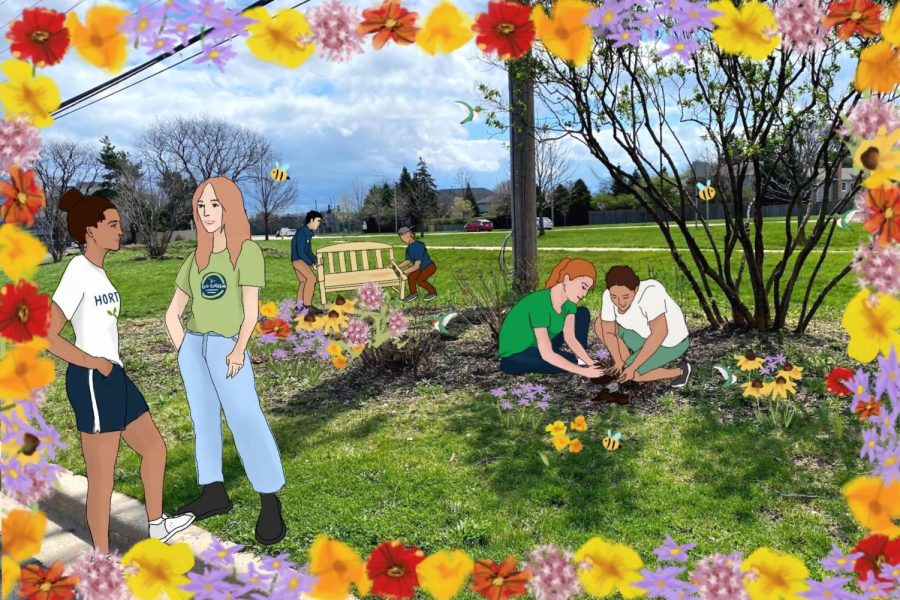Pollinator garden unites clubs at South
April 23, 2021
The blue from the azure asters, the yellow from the western sunflowers and the purple from the milkweeds will surround South’s prairie with bees and butterflies, trying to pollinate every flower in the warm temperature. This is what Science Teacher Lisa Pavic and the board of Planet Green, South’s environmental club, envisioned when applying for grants to make a pollinator garden: a garden that attracts pollinators using pollen and nectar-producing plants.
The Planet Green board has written many grants since Pavic became the club sponsor earlier this school year. So far, they have gotten one of their grants approved by the Illinois Department of Natural Resources (INDR) for $600, with the majority of these funds being used to buy flowers, Pavic said. Pavic noted that Planet Green members quickly began planning after they were awarded this grant.
“We created a budget, we said exactly which plants we wanted and how we would arrange it,” Pavic said. “Then, we really started to push and get hope in terms of clearing the area, making things happen and it was just great that the grant got this started.”
Although Planet Green’s pollinator garden kicked off this year, the idea for a prairie restoration on the south side of the school was not new. A few years ago, Science Teacher Jenny Friedmann gave a presentation about the dire situation of South’s prairie that was attended by people across many departments and age groups, Friedmann said.
“[Many people] drive past this area and wonder what’s so bad about [it],” Friedmann said. “It seems fine to [them] but again that whole space is all weeds taller than your head and cattails which are not invasive but also not the best thing to have only one of in that whole area. We brainstormed what we would like this area to be like.”
What was originally a very club-focused project, the pollinator garden soon turned into a very collaborative effort, bringing different South departments and clubs together, Pavic said. The English and the Career and Technical Education (CTE) Departments worked together to make benches. Elpida Club, a mental health-focused organization on campus, offered to help plant green plants because green symbolizes mental health awareness. Other clubs, such as Interact, offered to help with the planting once it starts. Additionally, the Horticulture Club provided input as to what species to plant, an area in which the members of Planet Green did not have much expertise.
“We need help because we can’t plant a garden alone,” Pavic said. “I am not a gardener or a horticulturist, but I am a big ecology person, but understanding plants is its own art. I can’t believe just reaching out and asking for help, everyone just says, ‘Yeah, let’s do this.’ It’s amazing.”
The planting phase for the pollinator garden officially begins on May 18, senior Sasha Menchaca said. The weather needs to get warmer in order for plants to effectively last for a long period of time. Planet Green members are not standing by until that day comes, but rather, are preparing what they can for the garden.
“[The club is] getting signs because we’re going to get plaques for the garden explaining [each plant],” Menchaca said. “We’re writing out the first couple of drafts [of the plaques].”
Even though plans to plant the pollinator garden have been thoughtfully drafted, there are still some questions as to how the garden will be maintained. Not everyone views the importance of preserving the environment the same way, senior Anne Marie Raab explained. Planet Green is planning to implement some solutions to maintain the garden, Raab said.
“We are creating signs to put in front of [the pollinator garden] and to help educate people and tell [the students] to keep our area clean,” Raab said. “We’ll definitely need to have clean-up days. We do a lot of those to pick out the invasive species of plants that are harmful to the garden.”
Planet Green does many projects every year, including the pollinator garden, however, with every project, the club’s goal and message do not change, Raab said.
“[Planet Green’s] main goal is to educate others about the environment more and we want more people to be aware of the environment,” Raab said.
The pollinator garden could be used for multiple purposes, Principal Dr. Lauren Fagel said. It could also be used as a classroom in the near future, not only for science classes but also for discussions and relaxation. Fagel believes that the pollinator garden is a very interesting idea that could serve to help the South community.
“Just expanding the places on campus where students and teachers can be together, I think is really exciting,” Fagel said. “I love the idea of students being able to be outside and when the weather is right, it’s very energizing and could really enhance their learning and their overall enjoyment of being in class.”



